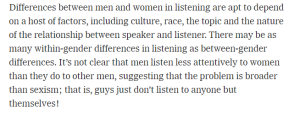
When you talk with your spouse, your loved ones, and your coworkers or employer, are you really listening? What does “really listening” mean to you? In this episode, Janine Hamner Holman sits down with Enrique Acosta Gonzalez, an entrepreneur, coach, author, speaker, and podcast host, to discuss the cost of not listening and communicating effectively.
GUEST: Enrique Gonzales | LinkedIn
HOST: Janine Hamner Holman | [email protected] | LinkedIn, Facebook, Instagram
What am I paying attention to this week? This little thing called risk. I’m doing a project with a client and we’re revisiting their mission, vision, and values. We had all these different words up, for words that resonated with them in terms of their current values, and a few values they want to live into even more. One of the words somebody had put up was risk. We got into talking about what the opportunity is when we take risks.
I was on a call with some clients earlier today, and one of them was talking about how he loves to be challenged. He loves to be stretching. He loves to be going for something a little outside his comfort zone, and sometimes a lot outside his comfort zone.
Then one of his colleagues said, “Oh, that makes me so nervous.” We had this great conversation about how we think, us humans, that we like to live our life at about 72 degrees. We like it when things are comfortable, and that’s not when we grow.
One of my friends and colleagues, one of his taglines is, “How many peak experiences have you ever had inside your comfort zone?” That’s not when we grow. That’s not when we learn. That’s not when we are challenged. That’s not when there’s extra juice in life.
That brings me right to our guest for today because today is going to be a different kind of podcast. I had to get comfortable with a little bit of risk for what we’re going to be talking about today. So buckle your seat belts, my friends.
Enrique Gonzalez is a 26-year Navy veteran, turned entrepreneur, author, coach, trainer, and speaker. He is the CEO of Triad Leadership Solutions and their podcast. He’s also the host of three different leadership shows. I had the opportunity to be on one of them, we were chatting about that in the pre-podcast chat. I am thrilled to welcome Enrique Acosta Gonzalez to the show.
Thank you, Janine. It’s a pleasure to be here. I’m glad you already covered risk because we’re about to get down and dirty on that one.
Let’s get into it. I’m going to start with the question I always start with, which is, what is something you have become aware of that either consciously or not consciously, we’re not paying enough attention to? What’s the cost of that inattention?
So what I’m going to bring up, there’s a big cost… when men don’t listen to their wives.

Whew. All right. Tell me more your theory about. Why is it that in your opinion, men don’t listen to their wives?
Before I get into that, let me piggyback off something you said earlier: People that are comfortable stay.
Let that sink in. If you endeavor to go anywhere, people that are comfortable stay. If you want to be anything, get uncomfortable. We’re about to get uncomfortable right now, because where do I come up with that?
Let me tell you, I’ve been married for quite a while. There came a time, about seven years ago I would say, that I realized I had allowed all competing things for my time to override the area I was comfortable in.
Sometimes in a relationship with your spouse, you get comfortable and things stay. They don’t grow. Because we know we have committed each other to a lifelong journey together, we don’t endeavor to foster our relationship as we would one in the business field.
If you ask yourself, what contracts have I engaged in business and how detailed am I to the point I get a lawyer to make sure the transactions are going, and we’re always doing due diligence and we’re always doing exploration of words…
Quality control…
You name it. We go at it. Then, for the most important contract we will ever get into, a lifelong journey, we don’t do that.
Right. Okay. Take a deep breath, everybody.
In realizing I had made more efforts towards other things than my wife, I started to notice a downcast in her.
You never know anything until you become aware. Men are notorious for this. You could probably attest to men saying things along the lines of “Okay, I’m tired of this. Where did that come from? What are you talking about? Everything’s fine.”
It’s usually the man saying everything’s fine, because we get comfortable. In a state of comfortability, although you feel secure, the lack of life will kill off whatever that is, including marriages. When you were talking about what cost is there of not paying attention, that’s the first thing my mind went toward.
Part of what I love about this conversation is it doesn’t matter if we are straight, gay, or transgender. It doesn’t matter if we’re white, Black, Latino, or Asian. It doesn’t matter if we’re talking about our personal life or our professional life.
Anytime we fall into that place of comfort, which can also equal taking for granted, then we have the opportunity to not pay enough attention to what’s going on over there.
We aren’t asking, “How is this going for you? What are your thoughts about how this might be better, more dynamic, or stronger?” We ask those questions often inside of a work context.
I was with a group of clients earlier today and I said, “Okay, this is our fifth call we’re doing as a cohort. How’s it going? Are there things you were hoping for that you’re not getting? Are there things that now we’re talking about it, you’re thinking, ‘Ooh, would it be possible? Is there the possibility we could create something else?’”
We do that inside of work, but we don’t do that in personal relationships. We don’t do those check-ins in, as you said, one of the most important contracts we’ll ever get into signing up, whether literally or figuratively, to spend our life with another person.
The cost… a lot of times there’s more said when there’s nothing said. Think about all the work you put in to cultivate external relationships. You don’t do that at home with your spouse. What are you saying to them? Because when you don’t, you’re saying a lot.
What do you think happens? Why do you think that… because obviously when we’re dating… it happens today is the five-year anniversary of my marriage to my husband. We’ve been together for a little more than 10 years. I remember because it wasn’t that long ago. When we were dating, we interacted differently with each other.
It’s been 10 and a half years we’ve been together and five we’ve been married. What do you think happens, that we stop listening or we stop paying enough attention? What are your theories around that?
There’s a level of assurance when you make that type of commitment. Depending on your level of assurance, it depends on how much you are willing to put into it. Some people, they’re so sure their marriage is going to be there, they forget there’s a human at the other end. The contractual agreement of matrimony or a lifelong relationship with someone is not the words, and it’s not the paper. It’s the daily actions supporting the fact the marriage even happened.

When you go about not adding life to that document, because what’s a testament? Somebody leaves. It doesn’t get enacted until somebody dies and someone else takes over. You have to bring life to that document.
It’s the same with marriage. You have to bring life to it. It’s always intriguing. I know because I’ve done it myself. In dating, it was wine and dining, left and right. We were going to the best places. Then you get married and you don’t go anywhere.
It turns into someone saying, “Hold up now, you sold me a bill of goods here. What was that? Was that a show? Was that your true capability? Because obviously you already did it, right? So you can’t say take it back.”
You look at the past, when we were spending $600 on a seven-course meal at a fancy five-star, not even five-star, a five-diamond restaurant. Now we can’t even go out to McDonalds.
I said to my husband today, he called me a little while ago and we hadn’t spoken yet today. I said, “Happy anniversary.” We had talked about going out to dinner and I said, “Should I make us a reservation?” He responded, “Yeah, maybe make us a reservation at El Patron” and my responsive thought was, honey, that’s where we go for Mexican food on a Tuesday. It’s our five-year anniversary and it hasn’t all been unicorns and rainbows. We’ve had to put in some work to get to five years. Let’s at least go to Flemings.
Something, give me a T-bone.
Exactly.
This happens so often and for the male, and I wanted to bring it up from the male perspective. I’ve learned my lesson at, I would say to one point, because I’m not perfect, and I’m sure if I got comfortable before, then if I’m not actively involved in making sure this stays the way it should, then I will return, no doubt, to being comfortable. It’s an active participation and should be from both sides.
I’m just talking to the men now because typically women bring their piece, but since we’re all human and are fallible, it may be that they don’t, right? Maybe they stop. Someone has to set the pace though, or else it will go stagnant right quick.
When a man, the leader… I hope in your house you are leading not by dictatorship, but by example, that you’re showing your spouse this is the way this should go. If you can do that, your wife will follow you. They’ll respond, “This is a good thing. This is a yes. Okay, let’s do it.”
Yes, let’s have some real conversations where you’re going to listen to me and what I think.
Ah, what!
That sounds awesome!
That’s the best day of my life!
When you open the doors to possibility, there’s no horizon. It just keeps going. That means we’re going to go somewhere. We’re traveling and we’re going to see all the flavors of life.
There may be obstacles and hurdles that come up, but guess what? We’re together. We’re going to do this thing. It makes my hair stand up. I just said that. From the male perspective, once you realize you may have been missing some cues, and, by all means, look, it’s okay to start right now.
Yeah.
I don’t care about yesterday. Speaking to our readers, as you read this, are you willing to go ahead and do it? I guarantee you, man, if you, after this show here, go to your wife and say, “I just heard this dude and he said something and it struck a chord. Can we take a pause right now? Now I need you to pause, don’t think of me from this point back, and give me an opportunity. I heard this guy and it resonated with me and I’ve realized I have not been putting the type of effort into us that I have into other things. I would like to make that right.”
I want to cry thinking about it, of what that lady is feeling inside. What a moment.
Right?
Bro, you’ll be the king. That’s all I say.
When you were saying that, I also got… my brain is going in many different directions. The first thing I want to plus you with, which is something that Archbishop Desmond Tutu used to talk about, I want to plus you with something else, which I loved.
I want to plus you with the idea that there’s a gentleman whose name is John Gottman, who has done extensive research. He’s probably the most quoted and looked-to person in the world of marriage counseling. One of the things he talks about is when everybody is bringing 100%, when everybody decides that they are 100% accountable for how this goes, not, “I am 50% accountable and you, Enrique are 50% accountable.” No, I am 100% accountable for how this goes. I make that determination on my own.

What’s also likely is if I decide I am 100% accountable, you are going to decide you are 100% accountable. We get afraid that if we decide we’re all in, you’re going to decide, “Well then I don’t have to do any work. I don’t have to worry about it at all.” Instead, often what happens is it challenges us to raise our game. It challenges our partner.
The other place my brain went when you were talking is it doesn’t actually matter… I mean, I love it that you’re talking from the perspective of a husband to his wife, and it can be a wife to her wife, it can be a husband to his husband, it can be a parent to a child, it can be a child to a parent, it can be an employer to an employee, or an employee to their employer.
Eight years ago when I worked at a Fortune 200 company, if I went to my boss and said, “Hey boss, I realized there’s a level at which I haven’t been giving it my all, and I don’t want to be showing up that way. I want to show up 100% me 100% of the time.”
I know of no boss who would say, “Oh no, that’s fine. Keep phoning it in at 65%.” Nor will they say, “How dare you have only been showing up part way.” They’ll respond with, “That’s awesome, and how can I pour more into you?” There’s no downside to having that conversation.
There is none. It’s more than likely, they have never had a person come to them with that type of sincerity, vulnerability, and authenticity all wrapped together and say, “Holy moly, I thought I saw it all until this person came and spoke to me.” Imagine what that will do.
A leader will probably say, “Okay, hold up now, how many others have been coming in here at 65%?” Or they may think, “What was I doing as a leader that I never created a space where people felt comfortable to approach me in that way?”
“If this is the first one, out of so many years I’ve been leading… Number one, this person’s brave to come tell me that, but did I ever open up the channels of communication where if somebody else wanted to, they could?” You’re going to definitely impact…
You’re going to rock the boat.
Oh yes. It’s a similar situation with a significant other, and you mentioned parents, let me tell you, significant other to another, or parent to child, holey moley it’s a powerful conversation.
If you want to impact someone, be a parent who can say, “Hey Jimmy… ” I need to stop because I’ll cry. I’ll stop boohooing over here.
Me too. If you start, I’ll start. We’ll be a mess together.
I can imagine this parent who comes to this point and this child who has always been wanting this. You will impact your child for the rest of their life. Not only will you impact them, but you will be a champion to them forever.
I want to take us on a slight detour. We can come back to this. I had an opportunity a little over a year ago to be the final keynote speaker at the U.S. Navy’s first summit on diversity.
I know you are a veteran of the Navy. One of the things I really enjoy about getting to do some work with the Navy is, when we think about our armed forces, in a number of ways, the Navy has been the ones who’ve been, in my limited experience, pushing the envelope on bringing humanity back into our armed services.
Brene Brown did a big project with the Air Force looking at the word “love” in the Air Force. It used to be, 50 years ago, the word love was spread throughout a number of codified things in the Air Force.

Over the last 50 to 70 years, it’s been scrubbed out. I don’t want to gloss over the fact that as a 26-year Navy veteran, as a Latino man, you just owned the fact you are a crier. That’s not something every man, forget about Latino man, forget about 26-year Navy veteran, is going to own.
I want to go down that road a little bit with you. Where has this comfort with yourself, your emotions, and comfort with vulnerability in that sort of way, come from? Tell me about that evolution.
It started with, and I will just say one word: truth. Most people are not living their own lives. They’re either living in opposition to some idea of what they’re “supposed to be doing,” or they’re living the life they think people want to see. Seldom do you get someone who is living to be true.
I spent a lot of years of my life on both those spectrums I just mentioned. Then finally I came to the point where I just want to be. Be completely what I was made to be. In that, I’m a crier, I’m sentimental.
I’ll tell you, don’t get me into a group where people are being emotional – I’m gone! I may not even know what’s happening or why everyone is emotional. I’m 100% in it with them. When you can do that, there’s nothing to hide behind. It’s the best way to live, I’ll tell you. I don’t ever have to apologize for it. Yes, there’s a military history, but even in the military, if I had to cry with a sailor, I was going to cry. They need that type of human interaction.
Absolutely.
They need it. It’s not for everything. You have to know when it is appropriate. But if they leave, and I thought it wasn’t appropriate in the moment, then I was crying by myself after, because we’re human.
Yes, we throw on uniforms. Yes, we handle weapons. Yes, we do some hard stuff. A lot of people don’t do hard stuff, but separation and deployments are still hard on everybody.
What I like about my journey in the Navy, it started hard first because, right from boot camp, they try to make you hard and you’re assimilating. I thought that’s what it was. Then I thought, “Ah, no, I don’t like it when it’s done to me so why am I going to do it.”
I got in positions where if it wasn’t right, and I thought it wasn’t right, it wasn’t going to be done. I started to impact not only the people around me but myself as well. I was allowing myself to be driven to be the type of leader who can touch the heart. If you can touch the heart, you can forget it. People will… you can say “Go take that hill.” They’ll take that one, and the one after it, in case you meant that other one.
It’s such a funny thing. Because I know you and I, we spend a lot of time in this leadership space. In general, of course, not all of us, but in general, we have collapsed the idea of vulnerability with weakness.
You and I are both on a campaign to decouple those ideas. Those are very different things. It takes strength to be vulnerable. When leaders, and as any longtime readers know, my perspective is, it doesn’t matter who you are in an organization.
It doesn’t matter if your job is cleaning the floors, or you’re the CEO, or anywhere in between. Anybody can be a leader. It’s not a function of rank.
When we step into our leadership, if we don’t stay connected to our humanity, when we don’t stay connected to our ability to be vulnerable, and our ability to touch people’s hearts, we are fundamentally not tapping into the whole human.
I used to have this idea that at home I was one version of Janine. Then I would go to work and I would be work-Janine. Work-Janine was all about getting stuff done. There was no drama or emotion, it was facts and getting things accomplished. In point of fact, that idea is nonsense.
When I was originally trained by Fred Ross, who trained Cesar Chavez in being a community organizer, one of his great sayings was, “Forget the facts and figures and tell them the story that brought you to the cause.” It is story, it is emotion, and it is vulnerability that moves people to action. Facts and figures don’t do it, but that’s what we all want to rely on. That’s what feels safe. That’s what feels business-y.
As a man, as a leader, how do you help leaders who, in positions of power and authority, unfortunately, are mostly still men, how do you help them navigate through that and get back in touch with their humanity and their ability to be vulnerable?
I’ll give you a quick story. When I approached this, I was the command senior enlisted leader of a fast response hydrography command.
Fast response means that within 24 hours you were on a C-130 to wherever it is you were going. We went everywhere. You were on a C-130, you were with the boat, and you were gone. Then you did your survey and your mission, and then you packed up and you were gone.
There was high turnover in terms of, it was all the time people were going. They would come back, have a couple of days, maybe weeks, and then they had another place to go.
The problem is, how do you sell to young sailors, to say they should reenlist?
I went to the senior enlisted academy and there you had to do country briefs. In my country brief I had chosen my next mission I knew I was going on.
I picked the country, and I did the mission brief. Then, once I started digging into the relationship between the U.S. and that country, and then the enemies in competition for resources, I started going deeper and deeper. Then I realized, no wonder these places we’re going to are the ones we pick. We’re building relationships. They can’t do the work we can.
We send our people, they do the work to help, they’re happy in that country, they get their information, we get the information, and we have a relationship so when you come and try to buy from this country, being an enemy, you might not get it. It makes sense to me, but guess what? No one was told that type of information when they were sending out these kids.
You’re not told you’re relationship-building.
Right. When I come back and I’m getting my crew, I got them all together, and I gave them that brief.
Their response was, “That’s what we are doing. Oh my goodness. This is way deeper than just a navy showing up.” In that moment, I gave them their why. I gave them the purpose.
From there, they looked forward. It didn’t matter how many trips, they knew why they were going. It was amazing. If anybody followed that after I was gone, I don’t know. While I was there, that’s what I did.
When you talk about industries and corporations and people at the head in leadership, if you cannot convey the why of why you exist and what these people are impacting, get out of business, go do something else. What you’re doing is you’re rolling the dice on people trying to figure that out. They won’t. They’ll say, “Hey, you pay me. I show up and we’ll be okay, until… “
Until I find something better.
Until I find something better or something I feel like doing. If you, as a leader, want to own your company, get that why solid. Then find out how every piece connects with that and tell your people. I think it’s pretty easy.
I love it. That’s exactly what I’m doing with this organization where we’re looking at values.
I want to so appreciate you, Enrique. I want to appreciate you as a leader. I want to appreciate you as an entrepreneur on this journey with me helping organizations. I want to appreciate you as a veteran. I want to appreciate you as a husband and as a father, and as somebody who has made a choice to play full out in your life.
I’m so delighted to know you. I’m so happy you were able to come here. I’m so thrilled you wanted to have this conversation. This has been wonderful. Thank you so much.
Thank you.
I am Janine Hammer Holman, and this has been The Cost of Not Paying Attention. Remember, great leaders make great teams. Until next time.
Important Links
About Enrique Gonzales
Enrique Gonzalez is a 26-year Navy veteran, turned entrepreneur, author, coach, trainer, and speaker. He is the CEO of Triad Leadership Solutions and their podcast. He’s also the host of three different leadership shows.





